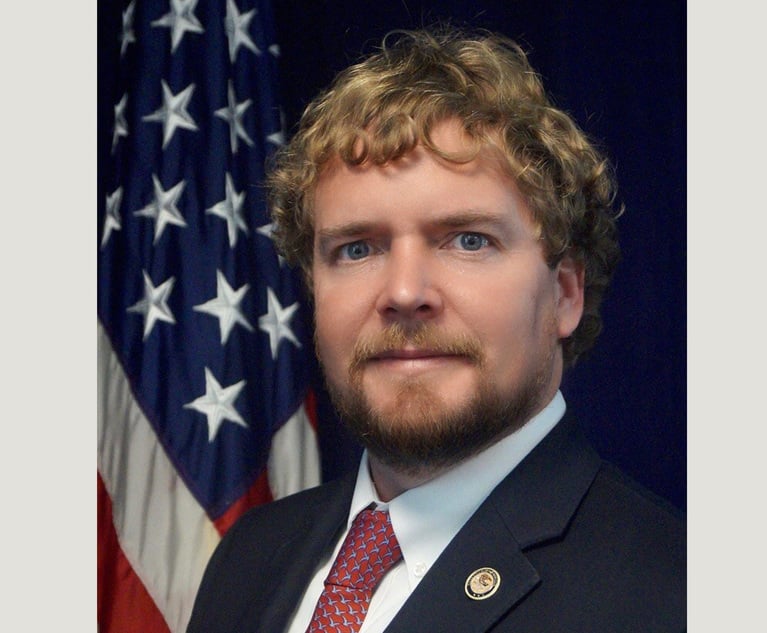As the Heat Bears Down, Beware of Lawyers' 'Seven Deadly Sins'
Your guide to avoiding the temptations of sloth, pride, lust, wrath, gluttony, greed and envy.
August 15, 2019 at 04:53 PM
38 minute read
 (Photos: Shutterstock.com)
(Photos: Shutterstock.com)
Editor’s Note: It was winter when Shari L. Klevens and Alanna Clair, the authors of the “In Practice” columns on legal ethics, proposed writing a series on “The Seven Deadly Sins of Lawyers.”
I liked the idea a lot. Like everyone else, lawyers are susceptible to greed, envy, pride and the rest, and it had a catchy title. Shari and Alanna, partners at Dentons, wrote their articles, and we published them every two weeks between January and April.
I wondered if the series might have more punch if it were packaged together, and amid the heat and humidity draping Atlanta this week, the time seems right to republish the pieces.
Researchers have posited for years a “heat hypothesis,” suggesting people are more aggressive during sweaty days. So if the temptations in a legal practice are extra hard to avoid as well, I present to you, below, Shari and Alanna’s thoughts to cool things down.
–Jonathan Ringel

Legal malpractice claim avoidance and compliance with ethical norms constitute a significant portion of the practice of law. Many firms have attorneys and professionals solely or at least partially dedicated to addressing and resolving potential risks to the practice.
As we begin a new year, the next several articles in this space will address the Biblical “seven deadly sins” through the lens of legal practice: sloth, pride, greed, lust, envy, gluttony and wrath. Even where lawyers and firms take special steps to prevent claims or comply with their ethical obligations, attorneys and firms still create risks for themselves by failing to answer to the better angels of their nature.
Although lawyers, as a profession, are considered to be detail-oriented and hard-working, some common mistakes made by lawyers are a result of a lack of attention. Indeed, attorneys can inadvertently fall into traps or routines in their practices that could increase potential exposure.
Here are some tips for how attorneys can overcome “sloth” and be vigilant about their responsibilities.
Be Aware of the Duty of Competence
Rule 1.1 of the ABA Model Rules of Professional Conduct provides: “A lawyer shall provide competent representation to a client. Competent representation requires the legal knowledge, skill, thoroughness and preparation reasonably necessary for the representation.” This is comparable to the typical standard of care owed by attorneys to clients, which, in most states, requires attorneys to exercise the care or skill commonly employed by other attorneys in similar conditions.
To that end, the standard of care owed by attorneys to clients evolves over time. The law changes, technology changes, and what an attorney is expected to know about those subjects changes over time. Thus, attorneys who do not undertake the effort to stay abreast of developments in the law or practice do themselves a disservice.
Many states recognize this need for attorneys to continue to learn about the law by requiring a number of hours each year dedicated to continuing legal education. Even for those states without any CLE requirement (or with a lower requirement), admitted attorneys may still seek out hours of training every year. Such training not only helps attorneys meet their ethical obligations of competence, but it can even be a business development tool for attorneys to attract clients and work.
This content has been archived. It is available through our partners, LexisNexis® and Bloomberg Law.
To view this content, please continue to their sites.
Not a Lexis Subscriber?
Subscribe Now
Not a Bloomberg Law Subscriber?
Subscribe Now
NOT FOR REPRINT
© 2025 ALM Global, LLC, All Rights Reserved. Request academic re-use from www.copyright.com. All other uses, submit a request to [email protected]. For more information visit Asset & Logo Licensing.
You Might Like
View All


Trending Stories
Who Got The Work
J. Brugh Lower of Gibbons has entered an appearance for industrial equipment supplier Devco Corporation in a pending trademark infringement lawsuit. The suit, accusing the defendant of selling knock-off Graco products, was filed Dec. 18 in New Jersey District Court by Rivkin Radler on behalf of Graco Inc. and Graco Minnesota. The case, assigned to U.S. District Judge Zahid N. Quraishi, is 3:24-cv-11294, Graco Inc. et al v. Devco Corporation.
Who Got The Work
Rebecca Maller-Stein and Kent A. Yalowitz of Arnold & Porter Kaye Scholer have entered their appearances for Hanaco Venture Capital and its executives, Lior Prosor and David Frankel, in a pending securities lawsuit. The action, filed on Dec. 24 in New York Southern District Court by Zell, Aron & Co. on behalf of Goldeneye Advisors, accuses the defendants of negligently and fraudulently managing the plaintiff's $1 million investment. The case, assigned to U.S. District Judge Vernon S. Broderick, is 1:24-cv-09918, Goldeneye Advisors, LLC v. Hanaco Venture Capital, Ltd. et al.
Who Got The Work
Attorneys from A&O Shearman has stepped in as defense counsel for Toronto-Dominion Bank and other defendants in a pending securities class action. The suit, filed Dec. 11 in New York Southern District Court by Bleichmar Fonti & Auld, accuses the defendants of concealing the bank's 'pervasive' deficiencies in regards to its compliance with the Bank Secrecy Act and the quality of its anti-money laundering controls. The case, assigned to U.S. District Judge Arun Subramanian, is 1:24-cv-09445, Gonzalez v. The Toronto-Dominion Bank et al.
Who Got The Work
Crown Castle International, a Pennsylvania company providing shared communications infrastructure, has turned to Luke D. Wolf of Gordon Rees Scully Mansukhani to fend off a pending breach-of-contract lawsuit. The court action, filed Nov. 25 in Michigan Eastern District Court by Hooper Hathaway PC on behalf of The Town Residences LLC, accuses Crown Castle of failing to transfer approximately $30,000 in utility payments from T-Mobile in breach of a roof-top lease and assignment agreement. The case, assigned to U.S. District Judge Susan K. Declercq, is 2:24-cv-13131, The Town Residences LLC v. T-Mobile US, Inc. et al.
Who Got The Work
Wilfred P. Coronato and Daniel M. Schwartz of McCarter & English have stepped in as defense counsel to Electrolux Home Products Inc. in a pending product liability lawsuit. The court action, filed Nov. 26 in New York Eastern District Court by Poulos Lopiccolo PC and Nagel Rice LLP on behalf of David Stern, alleges that the defendant's refrigerators’ drawers and shelving repeatedly break and fall apart within months after purchase. The case, assigned to U.S. District Judge Joan M. Azrack, is 2:24-cv-08204, Stern v. Electrolux Home Products, Inc.
Featured Firms
Law Offices of Gary Martin Hays & Associates, P.C.
(470) 294-1674
Law Offices of Mark E. Salomone
(857) 444-6468
Smith & Hassler
(713) 739-1250







